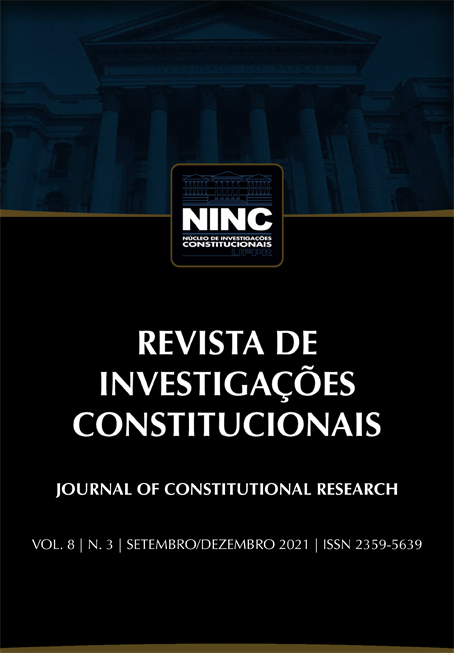Supremacía constitucional, jerarquía normativa y derechos humanos en México: evolución jurisprudencial histórica y narrativas actuales
DOI:
https://doi.org/10.5380/rinc.v8i3.76714Palavras-chave:
derechos humanos, supremacía constitucional, jerarquía normativa, derecho internacional, jurisprudenciaResumo
Este artículo desarrolla un análisis histórico de la relación y recepción del derecho internacional y sus instrumentos en el derecho interno mexicano a través de la práctica jurisprudencial. A partir de ello, evidencia un cierto desequilibrio jurídico-institucional debido a posturas garantistas y favorables a derechos humanos, frente a interpretaciones restrictivas o limitativas. En última instancia el artículo pretende evidenciar como las narrativas actuales respecto a la supremacía constitucional y la jerarquía normativa en México no son del todo acordes con la realidad globalizada de los derechos humanos actuales.
Referências
ARTEAGA NAVA, Elisur. Derecho Constitucional. 2. ed. México: Oxford University Press, 2001.
BURGOA, Ignacio. Derecho Constitucional Mexicano. 8. ed. México: Porrúa, 1991.
CÁMARA DE DIPUTADOS. Reformas Constitucionales. México, 2020. Disponible en: <http://www.diputados.gob.mx/LeyesBiblio/ref/cpeum_crono.htm>. Acceso: Sep. 16.
CARPIZO, Jorge. La interpretación del artículo 133 constitucional. Boletín Mexicano de Derecho Comparado, Nueva Serie, año II, n. 4, ene./abr., 1969.
CIANCIARDO, Juan. El ejercicio regular de los derechos: Análisis y crítica del conflictivismo. 1. ed. Buenos Aires: AdHoc, 2007.
CRAWFORD, James. Brownlie's Principles of Public International Law. 8 ed. Oxford: Oxford University Press, 2012.
DOUZINAS, Costas. The End of Human Rights. Oxford: Hart Publishing, 2000.
FERRAJOLI, Luigi. Más allá de la soberanía y la ciudadanía: un constitucionalismo global. In: CARBONELL, Miguel (Ed.). Teoría de la Constitución. México: Porrúa, 2000.
GEARTY, Conor. Spoils for which victor? Human rights within the democratic state. In: GEARTY, Conor; DOUZINAS, Costas (Ed.). The Cambridge Companion to Human Rights Law. New York: Cambridge University Press, 2012.
HABERMAS, Jürgen. Plea for a constitutionalization of international law. Philosophy and Social Criticism, vol. 40, n. 1, p. 5-12, 2014.
KELSEN, Hans. Principles of International Law. 2. ed. New York: Holt, Rinehart and Winston, 1966.
NACIONES UNIDAS. Vienna Convention on the Law of Treaties. O.N.U.: May 23. 1969.
RAMSEY, Michael D. The Supremacy Clause, Original Meaning, and Modern Law. Ohio State Law Journal, vol. 74, n. 4, 2013.
RODRÍGUEZ FERREIRA, Octavio. El nuevo sistema penal acusatorio en México. In: OCTAVIO RODRÍGUEZ FERREIRA; SHIRK, David A. (Ed.). La reforma al sistema de justicia penal en México. San Diego: Justice in Mexico, University of San Diego, 2013.
SAMAR, Vincent. Two Understandings of Supremacy: An Essay. Richmond Journal of Global Law and Business, vol. 9, n. 4, p. 339-380, 2010.
SHIRK, David. Criminal Justice Reform in Mexico: An Overview. Mexican Law Review, vol. 3, n. 2, p. 189-228, 2011.
SHIRK, David A. Reforma de la Justicia Penal en México. In: RODRÍGUEZ FERREIRA, Octavio; SHIRK, David (Ed.). La reforma al sistema de justicia penal en México. San Diego: Justice in Mexico, 2013.
TENA RAMÍREZ, Felipe. Leyes Fundamentales de México 1808 - 1997. 20. ed. México: Porrúa, 1997.
TENA RAMÍREZ, Felipe. Derecho Constitucional Mexicano. 32. ed. México: Porrúa, 1998.
ZAGREBELSKY, Gustavo. El derecho dúctil. 3. ed. Madrid: Trotta, 1999.
Downloads
Publicado
Como Citar
Edição
Seção
Licença
Autores que publicam nesta revista concordam com os seguintes termos:- Autores mantém os direitos autorais e concedem à revista o direito de primeira publicação, com o trabalho simultaneamente licenciado sob a Creative Commons - Atribuição 4.0 Internacional que permite o compartilhamento do trabalho com reconhecimento da autoria e publicação inicial nesta revista.
- Autores têm autorização para assumir contratos adicionais separadamente, para distribuição não-exclusiva da versão do trabalho publicada nesta revista (ex.: publicar em repositório institucional ou como capítulo de livro), com reconhecimento de autoria e publicação inicial nesta revista.
- Autores têm permissão e são estimulados a publicar e distribuir seu trabalho online (ex.: em repositórios institucionais ou na sua página pessoal) a qualquer ponto antes ou durante o processo editorial, já que isso pode gerar alterações produtivas, bem como aumentar o impacto e a citação do trabalho publicado (Veja O Efeito do Acesso Livre).
























